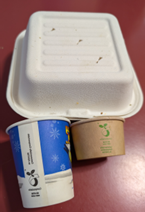
South Australian Science Teachers Association
Why Plastic Free July?
Posted by SASTA
on 21/07/2025

written by Jo Hendrix, KESAB
Lots of people know this month as Plastic Free July, but why?
Plastic Free July began 15 years ago in WA and is now an international movement to encourage us to reduce ‘Single Use Plastic’.
Compostwares, including PLA lid

Why do we need it?
Plastics have historically been fossil fuel based (a limited resource) and have only been in widespread daily use for around 50 years or so, but plastics last a very, very long time. This means plastics are useful for items designed to last a long time like school chairs, desks, storage containers but are not so good for items that might only be in use for months, weeks or days like snack packets and lots of food packaging. Often these single use items are small or lightweight and become litter items causing problems in the environment.
In SA, Single Use Plastic bans (https://www.replacethewaste.sa.gov.au/) began in 2021 to move away from fossil fuel based plastics and towards items made from plant based products that can be composted and become part of the circular economy (rather than being sent to landfill). Most items in school canteens (and cafes and at events) are now made from plant based products ( cardboard and fibre) or plant based plastics – look for the logo or tiny letters that say PLA ( polylactic acid – a plant based polymer, underneath a number 7 in the Plastics Identification mobius on lids of drink cups).
It is important to have collection systems at your school and events to capture ‘compostwares’ so they can make compost to grow more food! KESAB can support sites with bin assessments and recommendations.

A Wipe Out Waste school bin materials audit, the green circle shows how much material can be composted compared to the small red circled bags for landfill. This site now separates and collects compostables!
Another less visible area of plastic use is clothing and textiles, where polyester contributes to microplastic issues. Exploring alternative uniform options with natural fibres like hemp and cotton is another way to move beyond the plastic horizon.

Hats and schools polos from a local Adelaide provider of alternative uniform options
SA is leading the move away from Single Use Plastics and we have great commercial composters, so lets collect all the compostable materials to help them create compost for great food and jobs for our future.
Links below include educator resources and SA providers of plant based alternatives:
https://www.wow.sa.gov.au/resources/single-use-plastics
https://www.plasticfreesa.org/
https://www.hempclothingaustralia.com/pages/hemp-school-uniforms?_pos=1&_sid=cbabf73b7&_ss=r
Archive
- March 2026
- February 2026
- January 2026
- December 2025
- November 2025
- October 2025
- September 2025
- August 2025
- July 2025
- June 2025
- May 2025
- April 2025
- March 2025
- February 2025
- January 2025
- December 2024
- November 2024
- October 2024
- September 2024
- August 2024
- July 2024
- June 2024
- May 2024
- April 2024
- March 2024
- February 2024
- December 2023
- November 2023
- October 2023
- September 2023
- July 2023
- June 2023
- May 2023
- April 2023
- March 2023
- February 2023
- January 2023
- December 2022
- November 2022
- October 2022
- August 2022
- July 2022
- June 2022
- May 2022
- April 2022
- March 2022
- February 2022
- January 2022
- December 2021
- November 2021
- October 2021
- September 2021
- August 2021
- July 2021
- June 2021
- May 2021
- April 2021
- March 2021
- February 2021
- January 2021
- December 2020
- November 2020
- October 2020
- September 2020
- August 2020
- July 2020
- June 2020
- May 2020
- April 2020
- October 2018
- September 2018
- August 2018
- July 2018
